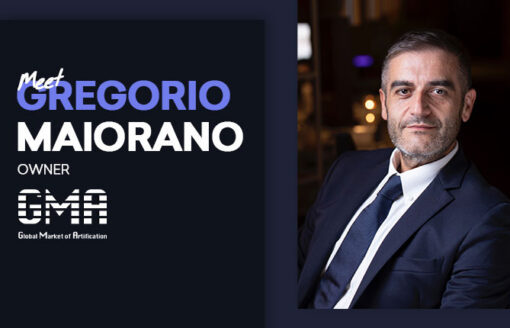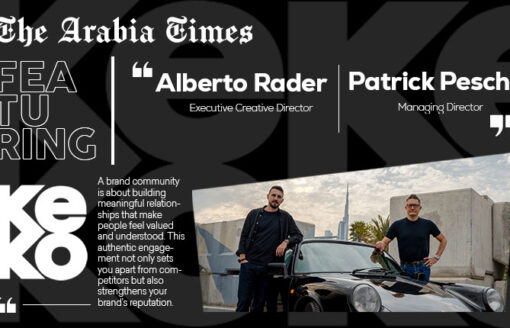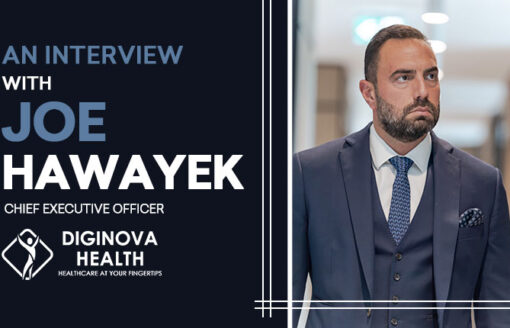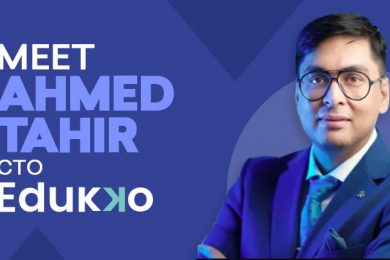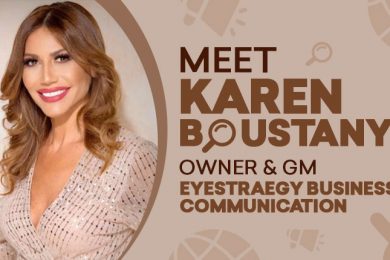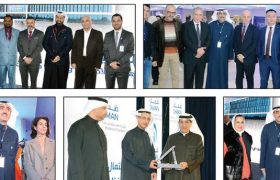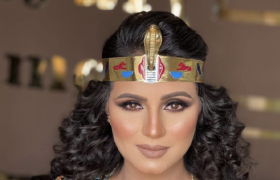Altaf Hendi Al-Mutairi, a prominent entrepreneur and activist, shares insights into her background and the initiatives she leads. As the Chairwoman of the entrepreneurship committee in the Kuwaiti Youth Assembly, she discusses the “MAAK” initiative aimed at fostering collaboration between entrepreneurs and decision-makers to enhance Kuwait’s entrepreneurship environment. Al-Mutairi, with expertise in luxury brand management, founded LBM Group to support creative minds in the fashion industry, emphasizing global expansion for local brands and facilitating foreign brands’ entry into the Gulf market.
Reflecting on her pivotal experiences, Al-Mutairi highlights the importance of sustainability in projects, derived from her involvement with the Kuwaiti Youth Council. She explains that her commitment to education and mentorship, evident in the LBM Group initiative, contributes to entrepreneurial success, especially in luxury brands. In navigating the international landscape, she emphasizes the need for cultural understanding and customization while addressing challenges like brand consistency and competition.
MAAK Initiative and LBM Group
We started the interview by asking, “Explain your background and your company in detail.”
Altaf replied, “I am a member of the Kuwaiti Youth Assembly the chairwoman of the entrepreneurship committee, and a secretary trustee in the international relations committee of the Kuwaiti Youth Council said that the “MAAK” initiative announced by the entrepreneurship committee of the Kuwaiti Youth Assembly is a great opportunity to bring together entrepreneurs and decision-makers to discuss the challenges facing entrepreneurs and find solutions that help improve the entrepreneurship environment in Kuwait. The “MAAK” initiative is a great platform for entrepreneurs to express their concerns and present their ideas in a professional way. It is also encouraging to see that the initiative aims to present these solutions in the form of recommendations to decision-makers and stakeholders. This can help to ensure that the ideas and proposals put forward by entrepreneurs are given the attention they deserve and can be integrated into decision-making and policy processes. In general, the “MAAK” initiative is an important step towards promoting a more supportive and enabling environment for entrepreneurship in Kuwait. By bringing together entrepreneurs, decision-makers, and stakeholders, the initiative can help to create a collaborative and inclusive ecosystem that supports the growth and success of Kuwaiti entrepreneurs.
As an entrepreneur and activist, I am specialized in luxury brand management and have founded and participated in the establishment of many projects in this industry. My education in luxury brand management at the IFA Paris Fashion Academy is a reflection of my deep belief in the importance of education and development in this field. My passion for creativity and my unwavering determination to achieve my goals inspire me to reach out to creative minds around the world, especially those who strive to embody excellence, uniqueness, and innovation. From my firm belief in the importance of luxury brands and fashion and their ability to make a lasting economic and developmental impact. And in recognition of the need to empower and support young talent in this industry, I established LBM GROUP as a platform to nurture their creativity and guide them towards success in the business sector. LBM is committed to providing high-quality services, relying on the expertise of specialists and professionals in this field, where we strive to be a bridge for local brands to reach the global and also facilitate the entry of foreign local brands into the Gulf market.
Shaping Perspectives & Origins of LBM Group
The Arabia Times: Your journey in entrepreneurship has been marked by diverse roles and impactful initiatives. Can you share a pivotal moment or project that significantly shaped your perspective and approach to managing luxury brands, particularly in the context of your work with the Kuwait Youth Council and various committees?
Altaf replied, “Going through the experience of the Kuwaiti Youth Council was enough to expand my horizons in the system and mechanisms of work at various levels, especially as it is the Constituent Council, as it is a responsibility in itself to realize the importance of creating a sustainable system that will be stepped down after the membership period, and this approach was reflected in the type of projects that I cooperated with her to establish the basics and their importance for sustainability projects.”
Then we asked, “What inspired the establishment of LBM Group, and how has the company evolved since its inception?”
Altaf continued, “My project was the result of my study at IFA Paris Academy to improve my brand, and I was seeking to understand this industry and how I could establish a brand with international standards. Therefore, I was keen to develop myself, and then came the idea of establishing the LBM Group, which is a bridge to reach success between creative mentalities and professionals in Paris, it expanded to several other countries, and I realized that we, as creative minds in the region, lack many experts to establish strong brands to grow in a professional and thoughtful manner, and we are still working on developing the project to meet the needs of our clients in a way that suits them.”
Fostering Innovation
As the Chairwoman of the entrepreneurship committee in the Youth Assembly of Kuwait, you play a key role in fostering innovation so we asked, “How do you envision the intersection of creativity and entrepreneurship, especially in the luxury brand sector, and what strategies do you employ to encourage these elements in your projects?”
Altaf answered, “In the fashion & luxury industry, the intersection of creativity and entrepreneurship is crucial for success. Creativity brings uniqueness and innovation to luxury brands, setting them apart from the competition. Entrepreneurship, on the other hand, ensures that these creative ideas are effectively managed, marketed, and monetized.
To encourage creativity and entrepreneurship in my projects, I employ several strategies. Firstly, I foster a culture that values and encourages creative thinking. This includes creating an open and supportive environment where ideas can be freely shared and explored. I also provide resources and opportunities for team members to enhance their creative skills through training, workshops, and exposure to new experiences.
In terms of entrepreneurship, I focus on developing a strong business mindset among team members. This involves teaching them about market trends, consumer behavior, and the financial aspects of running a luxury brand. I encourage them to think like entrepreneurs by considering profit margins, cost-effectiveness, and growth strategies.
Collaboration I truly believe in the power of collaboration, I utilize to promote creativity and entrepreneurship. By partnering with other creative professionals, such as designers, artists, or influencers, we can generate fresh ideas and tap into new markets. This collaborative approach also helps in sharing resources, expertise, and networks, which can be beneficial for both parties involved.
Lastly, I emphasize the importance of continuous learning and adaptation. The luxury industry is constantly evolving, so it’s important to stay up-to-date with the latest trends, technologies, and consumer preferences. By embracing change and being willing to take calculated risks, we can foster innovation and maintain a competitive edge. Overall, the intersection of creativity and entrepreneurship in the luxury brand sector requires a balance between artistic excellence and business acumen. By implementing these strategies, I aim to create a dynamic and thriving environment where creativity and entrepreneurship can flourish.”
Empowering through Education
The Arabia Times: Your commitment to education is evident in your background and role as a mentor in the KAFO initiative. How do you believe education contributes to entrepreneurial success, particularly in the realm of luxury brands? And how do you integrate this belief into your projects and initiatives?
Altaf continued, Education plays a vital role in entrepreneurial success, especially in the luxury brand space. By acquiring knowledge and skills through education, aspiring entrepreneurs can gain a solid foundation in business principles, marketing strategies, and industry trends. This knowledge provides them with the tools and understanding needed to make informed decisions, identify opportunities and navigate the complexities of the luxury brand sector.
In my projects and initiatives, I incorporate this belief by providing educational resources and mentorship programs. I am now a mentor at PLAYBOOK platform, providing aspiring entrepreneurs to establish and grow their brands as well as providing workshops, seminars and online training courses covering different aspects of luxury brand management. These educational opportunities help them develop their business acumen, hone their creative vision, and understand the nuances of the luxury market.
Additionally, I actively seek partnerships with educational institutions, industry experts, and thought leaders to bring diverse perspectives and experiences to our projects. By collaborating with these stakeholders, we create an inclusive environment that fosters innovation, encourages critical thinking and develops a deep understanding of branding in the fashion industry.
Furthermore, I believe in the power of experiential learning. Through internships, vocational training, and practical projects, we have opened the door to vocational training for ambitious entrepreneurs to apply their knowledge, hone their skills, and gain real-world experience. This practical exposure helps them bridge the gap between theory and practice, enabling them to develop a comprehensive entrepreneurial mindset.
Overall, incorporating education into my projects and initiatives allows me to empower aspiring entrepreneurs and equip them with the knowledge, skills, and confidence they need to succeed in the competitive branding landscape. By fostering a culture of continuous learning and providing access to educational resources, I strive to create a supportive ecosystem in which entrepreneurial success can flourish.
Global Insights
Being a member of the Small and Medium Enterprises Association and the Kuwaiti Business Council in Dubai suggests a global perspective, “How do you navigate the international landscape in the luxury brand industry, and what unique challenges and opportunities do you see for entrepreneurs working in this sector across different regions?”
Altaf replied, “Navigating the international landscape in the luxury brand industry requires a deep understanding of the cultural nuances, consumer preferences and market dynamics in each region. It is important to adapt strategies and product offerings to meet the unique tastes and preferences of each target market. This may include conducting extensive market research, building relationships with local partners, and customizing marketing campaigns to match the target audience.
One challenge that entrepreneurs operating in this sector across different regions may face is maintaining brand consistency while maintaining its cultural relevance. Luxury brands often have a distinct brand identity and image that they need to uphold, but they also need to adapt to local preferences and cultural sensitivities. Finding the right balance between global brand consistency and local customization can be a challenge, but it also represents an opportunity for entrepreneurs to differentiate themselves and create a unique value proposition in each market.
Another challenge is competition. The luxury brand industry is highly competitive, with both established players and emerging brands vying for market share. Entrepreneurs entering this sector need to identify their unique selling points, develop a strong brand positioning, and find ways to differentiate themselves from competitors. This could be through innovative product design, exceptional customer service, or creating a distinctive brand experience.
In terms of opportunities, the luxury brand industry offers huge potential for growth and profitability. As emerging markets continue to rise and the global middle class expands, there is an increasing demand for luxury products and experiences. Entrepreneurs who can tap into these markets and offer unique, high-quality products and services have the opportunity to establish themselves as major players in the industry.
Moreover, the digital revolution has opened new horizons for entrepreneurs in the luxury brand industry. E-commerce, social media and digital marketing platforms enable entrepreneurs to reach a global audience, bypass traditional distribution channels and expand their customer base.
In short, navigating the international landscape in the local branded fashion industry requires a deep understanding of different markets, cultures and consumer preferences. By conducting thorough research, cultural sensitivity, establishing strategic partnerships, and leveraging digital platforms, entrepreneurs can overcome challenges and capitalize on opportunities in this sector.”
Empowering Women in Luxury
The Arabia Times: Your dedication to reaching women worldwide, emphasizing excellence, uniqueness, strength, and femininity, is inspiring. Could you elaborate on how you incorporate these values into your projects and initiatives, and what specific impact do you aim to achieve for women in the entrepreneurial and luxury brand space?
Altaf continued, “Thank you for your kind words. At LBM Group, we are committed to empowering women around the world and promoting their excellence, uniqueness, strength and femininity. We integrate these values into our projects and initiatives by creating opportunities for women in the field of entrepreneurship and branding without stripping women of their being, but rather using their qualities that support and cherish creativity to produce creative brands that emulate society in general and women in particular.
One of the ways we do this is by providing guidance and guidance that helps women develop their skills and knowledge in the fashion industry. We believe that by providing them with the necessary tools and guidance, women can thrive as entrepreneurs and make a significant impact in the luxury branding space.
Additionally, we strive to create a supportive and inclusive community where women can connect, collaborate, and empower each other. By fostering an environment that celebrates diversity and encourages cooperation, we aim to break down barriers and create more opportunities for women in this industry. Currently, the rate of women in the LBM Group is equivalent to 90%. We do not mean to marginalize the role of men in this industry, as we seek to achieve a balance between women and men. Empowering creative minds in general, while taking into account differences”
Diplomatic Entrepreneurship
Balancing roles as a secretary trustee in the international relations committee and a member of the Youth Assembly of Kuwait requires a multifaceted skill set. “How do you manage these diverse responsibilities, and what role do you see diplomacy playing in fostering entrepreneurship and collaboration, especially in the context of your international engagements and memberships?”
Altaf replied, “Managing diverse responsibilities, such as being Secretary of International Relations and member of the Kuwait Youth Council, requires effective time management, organization, and prioritization skills. It is important to create a schedule or set clear goals to ensure that all responsibilities are given the necessary attention.
In terms of the role of diplomacy in promoting entrepreneurship and cooperation, it plays a crucial role in creating an environment that supports international trade and business partnerships. Diplomacy helps build relations between countries, promote dialogue, and resolve conflicts, which are necessary to enhance cooperation and create opportunities for entrepreneurs, and my role in the International Relations Committee may not differ from what I do in the LBM Group, as we both express the bridge of access between the parties concerned and the exchange of experiences. Between specialists and creating cooperation and partnerships between them.
Through international participations and memberships, diplomatic efforts can facilitate the exchange of ideas, knowledge and resources between different countries. This can lead to increased innovation, business growth and create new opportunities for entrepreneurs.
Furthermore, diplomacy can help shape policies and regulations that support entrepreneurship and trade. This is by understanding the obstacles and submitting proposals for solutions to them. This is our primary role in the Council, and by advocating for fair and transparent business practices, diplomats can create an enabling environment for entrepreneurs to achieve prosperity and build successful businesses.
Overall, diplomacy plays a crucial role in promoting entrepreneurship and cooperation by creating an enabling environment, facilitating dialogue and partnerships, and advocating for supportive policies and regulations.”
Altaf Hendi’s Key Advice for Entrepreneurs
Lastly we asked, “What advice would you give to other entrepreneurs?”
“I advise myself and my colleagues regularly as follows:
Be adaptable as the business landscape evolves, so be willing to adapt and embrace change when needed. Network and build relationships with other entrepreneurs and industry professionals for two reasons. Building a strong network can provide support, partnerships, and opportunities. Embrace and Learn from your failures, and because they are necessary, they serve as a testing point toward future success. Focus on the customer elements specific to your customers’ basics and preferences and create products or services that solve their problems or fulfill their desires remember your brand is not about you it is about your consumer, Be organized and manage your time, and then good time management skills begin to work first on their basis and progress. Ensure that research, knowledge, and continuous learning, stay up to date with the latest industry trends and their best effective technologies, expand your knowledge and skills to master the competition, obtain a specific vision, define your long-term vision for your business, and set smart goals (specific and measurable and must be relevant and specific there) Except to follow you and track progress. Do not be ashamed to ask for review and guidance and for mentors or skilled administrators who can provide completely independent vision and advice in entrepreneurship, Trust in God and then in yourself, trust in your abilities, and believe in the value that your work provides, Believe in yourself, be persistent, and never give up.” Altaf concluded
Connect Altaf Hendi Al-Mutairi on LinkedIn
Visit LBM Group to learn more
You can read more interviews here:
An Candid chat with RRajesh Jagaasiia
Meet Hrvoje Kapetanovic: Empowering Business Growth


